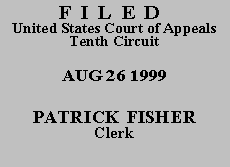

| RAYMOND C. CHRISTIAN,
Plaintiff-Appellant, v. MARVIN T. RUNYON, Postmaster General, United States Postal Service Agency, Defendant-Appellee. |
|
Plaintiff-appellant Raymond C. Christian, a former employee of the United States Postal Service, appeals pro se from the district court order granting summary judgment in favor of defendant-appellee on his claims alleging racial and disability discrimination, brought under Title VII of the Civil Rights Act of 1964, 42 U.S.C. §§ 2000e through 2000e-17, and the Rehabilitation Act of 1973, 29 U.S.C. § 701-796. We exercise jurisdiction pursuant to 28 U.S.C. § 1291 and affirm.
In 1992, Mr. Christian resigned from his position as distribution clerk, alleging in a 1993 charge with the Equal Employment Opportunity Commission (EEOC) that he had been discriminated against on the basis of his race, which caused job-related emotional distress. After the resignation, he applied for social security disability benefits, claiming a severe mental impairment. In granting the application, an administrative law judge found that, from July 1992 through May 1994, Mr. Christian "could not tolerate work pressures," "complete a normal work week without interruptions from psychologically-based symptoms," or "perform at a consistent pace without an unreasonable number and length of rest periods." R. Vol. I, tab 14, ex. 9 at 4-5. Accordingly, Mr. Christian was found to have had a "severe personality disorder and psychotic disorder" entitling him to disability benefits until May 1, 1994, at which time his mental impairment improved. Id.
On September 8, 1994, Mr. Christian's EEOC charge was resolved by a settlement agreement. Under the terms of the agreement, he applied for reinstatement with the Postal Service in Oklahoma, with the understanding that his application would receive the direct consideration of Barbara Flowers, the manager of mail processing and distribution in Tulsa. The human resources department informed him that he had been recommended for reinstatement, and that he should arrange to take a battery of noncompetitive tests and undergo a pre-employment physical examination, as required by Postal Service regulations.
A medical officer for the Postal Service performed an assessment of Mr. Christian's physical examination report, medical history, employment history, and documentation relating to the social security disability decision. Noting that Mr. Christian had "been diagnosed by physicians with enduring conditions that are not 'cured' in the sense that they can be treated and never return," id., ex. 8 at 3, he concluded that Mr. Christian was at "high risk" and not medically qualified to perform the essential functions of a mail processor, given the highly cooperative, detailed, and fast-paced work required of a mail processor, id.; see also ex. 10 at 8. After reviewing the "high risk" assessment, Ms. Flowers recommended that Mr. Christian not be reinstated. The Postal Service therefore denied the request for reinstatement.
Mr. Christian sued, claiming that the Postal Service had (1) breached the settlement agreement; (2) discriminated against him on the basis of his race and disability by allowing a biased staff physician to perform a medical assessment and otherwise depriving him of a fair opportunity for reinstatement; and (3) retaliated against him for filing the earlier EEOC charge. The district court determined that Mr. Christian had failed to come forward with evidence raising a genuine issue of material fact on any of his claims, so that defendant was entitled to entry of summary judgment.
We review the grant of summary judgment de novo, applying the same standard as the district court and examining the record in the light most favorable to the party opposing the motion to determine whether any genuine issue of material fact was in dispute and whether the substantive law was applied correctly. See McKnight v. Kimberly Clark Corp., 149 F.3d 1125, 1128 (10th Cir. 1998). "[I]n so doing we examine the factual record and reasonable inferences therefrom in the light most favorable to the party opposing the motion. However, where the non moving party will bear the burden of proof at trial on a dispositive issue, that party must go beyond the pleadings and designate specific facts so as to make a showing sufficient to establish the existence of an element essential to that party's case in order to survive summary judgment." Id. (quotations and citations omitted).
In our de novo review of the record, we have identified no genuine issue of material fact and no error in the district court's legal conclusions. We specifically reject Mr. Christian's contention that, in its summary judgment ruling, the district court considered facts which were not presented in defendant's filings.
We also disagree with Mr. Christian's assertion that the district court erred in denying his motion for a blanket sixty-day extension of time on all dates listed in the scheduling order. We review the denial of a motion for extension of time for abuse of discretion. See Buchanan v. Sherrill, 51 F.3d 227, 228 (10th Cir. 1995) (extension under Fed. R. Civ. P. 6(b)(1)); Jensen v. Redevelopment Agency, 998 F.2d 1550, 1553 (10th Cir.1993) (extension under Fed. R. Civ. P. 56(f)). Although Mr. Christian argues that he needed additional time to conduct discovery, he fails to identify any facts which could have been revealed through additional discovery. On this record, we cannot conclude that the district court abused its discretion in denying the motion for extension of time.
We therefore AFFIRM for substantially the same reasons stated in the district court's order dated May 20, 1998. The mandate shall issue forthwith.
Entered for the Court
Circuit Judge
*. This order and judgment is not binding precedent, except under the doctrines of law of the case, res judicata, and collateral estoppel. The court generally disfavors the citation of orders and judgments; nevertheless, an order and judgment may be cited under the terms and conditions of 10th Cir. R. 36.3.